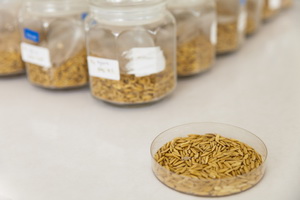
Discovery of MPK Roles in Rice by Characterizing CRISPR-Edited Mutants
October 18, 2017| |
 The CRISPR-Cas9 system depends on a guide RNA (gRNA) to specify its target. Efficiently co-expressing multiple gRNAs that target different genomic sites enables multiple gene editing in the family of closely related mitogen-activated protein kinase (MPK) genes in rice (Oryza sativa).
The CRISPR-Cas9 system depends on a guide RNA (gRNA) to specify its target. Efficiently co-expressing multiple gRNAs that target different genomic sites enables multiple gene editing in the family of closely related mitogen-activated protein kinase (MPK) genes in rice (Oryza sativa).
The team from Pennsylvania State University identified MPK1 and MPK6, orthologs of Arabidopsis AtMPK6 and AtMPK4, respectively, as essential genes for rice development using CRISPR-edited mutants. The true knock-out mutants of MPK1 were severely dwarfed and sterile. While heterozygous mutants were able to produce seeds, homozygous mpk1 seeds were defective in embryo development. Meanwhile, heterozygous mpk6 mutant plants failed to produce homozygous mpk6 seeds.
The CRISPR-Cas9 system had a 45–86% frequency for the successful creation of mutants while simultaneously targeting two to eight genomic sites. The mutations were also stably inherited in the next generation.
This study reveals the importance of MPK1 and MPK6 in rice development. CRISPR-Cas9 technology enabled the functional discovery of genes or domains with phenotypes masked by plant death.
For more on this study, read the article in The Plant Journal.
| |
Biotech Updates is a weekly newsletter of ISAAA, a not-for-profit organization. It is distributed for free to over 22,000 subscribers worldwide to inform them about the key developments in biosciences, especially in biotechnology. Your support will help us in our mission to feed the world with knowledge. You can help by donating as little as $10.
-
See more articles:
-
News from Around the World
- Global Hunger Index Shows Long-term Decline But Level Remains High
- Golden Rice to Lead the Way in Producing Healthier Rice Varieties
- Biotechnology a Key Part of Uganda's Food Security Strategy
- ITIF, Independent Scientists Call on US Interior Secretary to Reverse Policy Against GM Seeds
- Australian OGTR Receives Application for Commercial Release of GM Safflower
- Found: Gene to Help Hybrid Wheat Breeding
- Amazonian Farmers Discovered Secret to Wild Rice Domestication 4,000 Years Ago
-
Research Highlights
- Overexpression of BjHMGS1 Improves Health-Promoting Compounds in Tomato Fruit
- The Strawberry FaTPK1 Plays a Critical Role in Fruit Quality Formation
-
Beyond Crop Biotech
- Scientists Discover a Gene that Makes Fungi Pathogenic
- Zygote injection of CRISPR-Cas9 Modifies the Target Gene without Unwanted Effects in Pigs
-
Resources
- IPBO Fact Series on Cotton and Maize in Africa
- Updated Pocket Ks on Benefits of GM Crops
-
Plant
- CRISPR-Cas9-Mediated Targeted Mutagenesis in Seedless Grapes
- Discovery of MPK Roles in Rice by Characterizing CRISPR-Edited Mutants
-
Read the latest: - Biotech Updates (February 11, 2026)
- Gene Editing Supplement (January 28, 2026)
- Gene Drive Supplement (February 22, 2023)
-
Subscribe to BU: - Share
- Tweet
